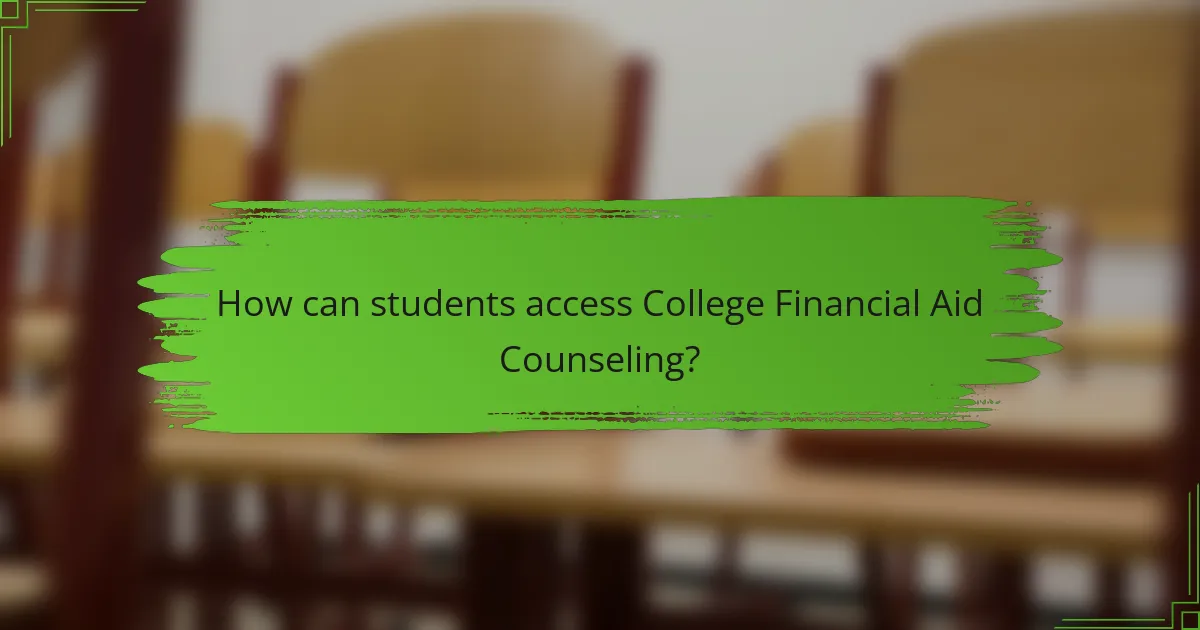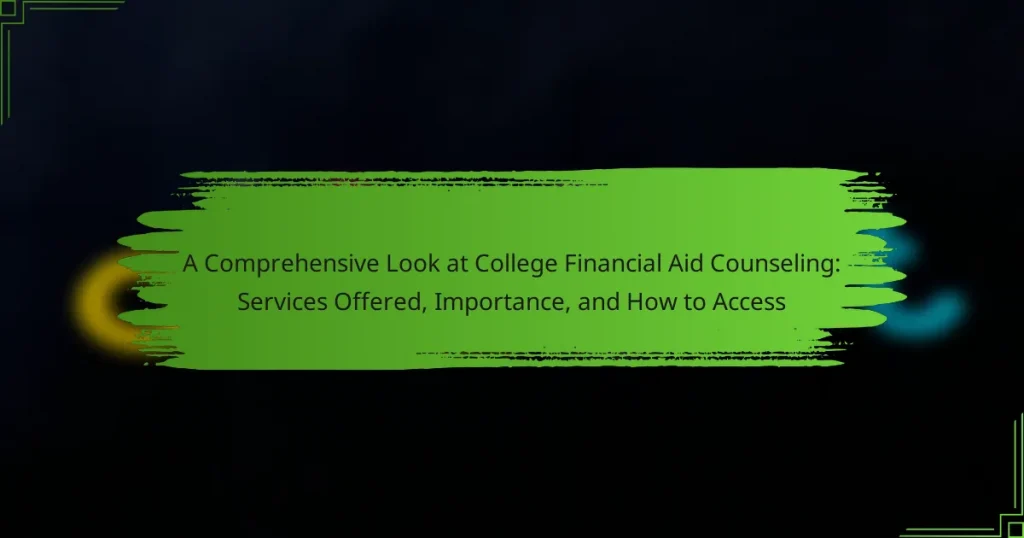
What is College Financial Aid Counseling?
College financial aid counseling is a service that helps students and families navigate the financial aid process for higher education. This counseling includes guidance on scholarships, grants, loans, and work-study opportunities. Counselors assist in completing the Free Application for Federal Student Aid (FAFSA) and understanding financial aid packages. They also provide information on eligibility requirements and deadlines. According to the National Association of Student Financial Aid Administrators, effective counseling can significantly increase the likelihood of students receiving financial aid. This support is crucial for making informed decisions about funding college education.
How does College Financial Aid Counseling support students?
College Financial Aid Counseling supports students by providing personalized guidance on financial aid options. Counselors help students understand the types of aid available, including grants, scholarships, and loans. They assist in completing the Free Application for Federal Student Aid (FAFSA) and other financial aid forms. This support can lead to increased financial literacy among students. Studies show that informed students are more likely to secure funding for their education. Counselors also help students create budgets and manage their finances effectively. Additionally, they offer resources for scholarship searches and financial planning. This comprehensive support enhances students’ chances of successfully funding their college education.
What are the key components of College Financial Aid Counseling?
The key components of College Financial Aid Counseling include understanding financial aid options, completing the FAFSA, and developing a financial plan. Financial aid options encompass grants, scholarships, loans, and work-study programs. Completing the FAFSA is essential for determining eligibility for federal and state aid. Developing a financial plan helps students budget for tuition and living expenses. Counselors provide personalized guidance tailored to individual circumstances. They also help students understand the implications of student loans. Additionally, they assist with scholarship searches and application processes. Overall, these components ensure students make informed financial decisions regarding their education.
How do counselors assess individual financial needs?
Counselors assess individual financial needs through detailed evaluations of a person’s financial situation. They typically begin by gathering comprehensive financial information from the individual. This may include income, expenses, debts, and assets. Counselors also consider the individual’s educational goals and family circumstances. They may use standardized financial assessment tools to quantify needs. These tools help in determining eligibility for financial aid programs. Additionally, counselors engage in discussions to understand personal financial goals. This holistic approach ensures accurate assessment and tailored financial advice.
Why is College Financial Aid Counseling important?
College financial aid counseling is important because it helps students navigate the complex financial aid process. This counseling provides personalized assistance in understanding various funding options. It can clarify the differences between grants, loans, and scholarships. Students receive guidance on completing the Free Application for Federal Student Aid (FAFSA). This process is crucial for accessing federal and state financial aid. Effective counseling can increase the likelihood of securing adequate funding. Studies show that students who receive financial aid counseling are more likely to enroll in college. Additionally, informed students are better equipped to manage their educational expenses responsibly.
What impact does financial aid counseling have on college access?
Financial aid counseling significantly enhances college access for students. It provides essential information about financial aid options. Counselors help students understand grants, scholarships, and loans. This guidance reduces confusion around the financial aid process. Research shows that informed students are more likely to apply for aid. A study by the National Center for Education Statistics found that students receiving counseling increased their college enrollment rates by 10%. Additionally, financial aid counseling addresses barriers such as misinformation and fear of debt. With accurate information, students feel more confident in pursuing higher education. This support ultimately leads to increased college access for underrepresented groups.
How does it influence student success and retention rates?
College financial aid counseling significantly influences student success and retention rates. Effective financial aid counseling helps students understand their funding options. It clarifies the financial commitments associated with college attendance. Students who receive proper guidance are more likely to enroll and persist in their studies. Research indicates that institutions offering comprehensive financial aid counseling see higher retention rates. For instance, a study by the National Center for Education Statistics found that students who received financial aid counseling had a 10% higher retention rate compared to those who did not. This support reduces financial stress, allowing students to focus on their academic goals. Consequently, informed students are more likely to succeed and graduate on time.

What services are offered in College Financial Aid Counseling?
College Financial Aid Counseling offers services such as personalized financial aid assessments. These assessments help students understand their financial needs and options. Counselors provide guidance on completing the Free Application for Federal Student Aid (FAFSA). They assist in identifying available scholarships and grants. Workshops are often held to educate families about financial aid processes. Additionally, counselors offer budgeting advice to manage educational expenses. They also help students appeal financial aid decisions if necessary. Overall, these services aim to make college more accessible through informed financial planning.
What types of financial aid can counselors help students access?
Counselors can help students access various types of financial aid. This includes federal grants, such as Pell Grants, which provide need-based funding. Counselors also assist with federal student loans, including Direct Subsidized and Unsubsidized Loans. They guide students in applying for state grants that are available in their respective states. Additionally, counselors can help students find scholarships from private organizations and institutions. They provide information on work-study programs that offer part-time jobs to students. Lastly, counselors may assist with understanding financial aid packages and loan repayment options. These services are crucial for navigating the complexities of funding higher education.
How do counselors assist with scholarships and grants?
Counselors assist with scholarships and grants by providing guidance and resources to students. They help students identify suitable scholarship and grant opportunities based on individual qualifications. Counselors also assist in the application process, ensuring that students meet deadlines and requirements. They offer advice on writing personal statements and gathering necessary documentation. Additionally, counselors may conduct workshops to educate students about financial aid options. According to the National Association for College Admission Counseling, effective counseling increases students’ chances of securing financial aid. This support can significantly reduce the financial burden of college education.
What role do counselors play in loan management?
Counselors play a crucial role in loan management by providing guidance and support to borrowers. They help individuals understand their loan options and repayment plans. Counselors assess a borrower’s financial situation to recommend suitable strategies. They also educate borrowers on interest rates, terms, and conditions of loans. Additionally, counselors assist in budgeting and financial planning to ensure timely loan repayments. Their expertise can prevent default and promote financial literacy. Research indicates that borrowers who engage with counselors are more successful in managing their loans effectively.
How do counselors provide personalized financial planning?
Counselors provide personalized financial planning by assessing individual financial situations. They evaluate income, expenses, debts, and savings. This assessment helps identify specific financial goals. Counselors then create tailored financial plans based on these goals. They offer advice on budgeting, saving, and investing. Counselors also provide information on financial aid options for education. They help clients understand loans, grants, and scholarships available. Regular follow-ups ensure plans remain aligned with changing circumstances. This personalized approach enhances financial literacy and empowers informed decision-making.
What tools and resources do counselors use for financial planning?
Counselors use various tools and resources for financial planning. These include budgeting software, financial calculators, and spreadsheets. Budgeting software helps track income and expenses effectively. Financial calculators assist in estimating loan payments and savings growth. Spreadsheets allow for custom financial planning models. Counselors also utilize online resources like financial aid websites. These websites provide up-to-date information on scholarships and grants. Professional associations offer training and guidelines for best practices. These resources enhance the accuracy and effectiveness of financial planning advice.
How do counselors help with budgeting and expense tracking?
Counselors assist individuals with budgeting and expense tracking by providing tailored financial advice. They analyze clients’ income and expenses to create personalized budgets. Counselors also educate clients on financial literacy principles. They help identify spending patterns and areas for potential savings. Additionally, counselors may introduce clients to budgeting tools and apps. They support clients in setting realistic financial goals. Regular check-ins ensure clients stay on track with their budgets. Research shows that guided budgeting increases financial stability and reduces stress.

How can students access College Financial Aid Counseling?
Students can access College Financial Aid Counseling through their college’s financial aid office. Most colleges provide dedicated staff for financial aid counseling. Students can schedule appointments, visit during office hours, or access online resources. Many institutions also offer workshops and informational sessions. These resources help students understand financial aid options, application processes, and eligibility requirements. Additionally, students can find guidance through official college websites and student portals. These avenues ensure students receive the necessary support for navigating financial aid effectively.
What steps should students take to find financial aid counseling?
Students should start by visiting their college’s financial aid office. This office typically offers counseling services. They can provide information on available financial aid options. Students should also check the college’s website for resources. Many institutions have online tools for financial aid counseling. Additionally, students can attend financial aid workshops or seminars. These events often cover important topics and provide guidance. Finally, students may contact local community organizations for additional resources. These organizations sometimes offer free financial aid counseling services.
How can students identify accredited counseling services?
Students can identify accredited counseling services by checking for credentials from recognized organizations. Accreditation ensures that the service meets specific standards of quality. Students should look for affiliations with bodies like the Council for Accreditation of Counseling and Related Educational Programs (CACREP). Additionally, they can verify if the counselors hold relevant licenses and certifications. Online reviews and testimonials can also provide insight into the service’s reputation. Many institutions list their accredited services on official websites. This transparency helps students make informed choices about their counseling options.
What questions should students ask potential counselors?
Students should ask potential counselors about their experience and qualifications. Inquire about the counselor’s education and relevant certifications. Ask how long they have been providing financial aid counseling. Request details on the services they offer, such as assistance with applications and understanding financial aid packages. Clarify their approach to helping students secure funding. Discuss their familiarity with various financial aid programs, including scholarships and grants. Ask for examples of successful outcomes from previous students. Finally, inquire how they stay updated on changes in financial aid policies and regulations.
What are the best practices for engaging with financial aid counselors?
The best practices for engaging with financial aid counselors include being prepared with specific questions and documents. Students should gather financial information and academic records before meetings. Clear communication is essential for effective engagement. Students should express their needs and concerns openly. Following up after meetings helps reinforce understanding and commitment. Understanding the counselor’s role enhances the relationship. Researching financial aid options beforehand provides context for discussions. Being respectful of the counselor’s time fosters a positive interaction.
How can students prepare for their counseling sessions?
Students can prepare for their counseling sessions by gathering relevant documents and reflecting on their goals. They should collect financial statements, tax returns, and any scholarship information. Organizing these documents helps streamline the counseling process. Additionally, students should think about their financial needs and academic objectives. Writing down specific questions can guide the discussion. Familiarizing themselves with financial aid options is also beneficial. This preparation enables a more productive session and ensures that students receive tailored advice.
What common pitfalls should students avoid during the process?
Students should avoid procrastination during the financial aid process. Delaying applications can lead to missed deadlines for grants and scholarships. Additionally, students should not overlook the importance of researching all available aid options. Many students fail to explore federal, state, and institutional aid thoroughly. Ignoring eligibility requirements is another common pitfall. Each aid source has specific criteria that must be met. Students often underestimate the value of accurate documentation. Incomplete or incorrect forms can result in delays or denials. Lastly, failing to seek help when needed is a significant mistake. Utilizing financial aid counselors can provide essential guidance and support.
College Financial Aid Counseling is a vital service designed to assist students and families in navigating the complexities of financial aid for higher education. This article explores the importance of financial aid counseling, the key services offered, and how students can access these resources. It highlights the role of counselors in providing personalized guidance on scholarships, grants, loans, and budgeting, as well as their impact on college access and retention rates. Additionally, the article outlines best practices for engaging with counselors and common pitfalls to avoid during the financial aid process.




